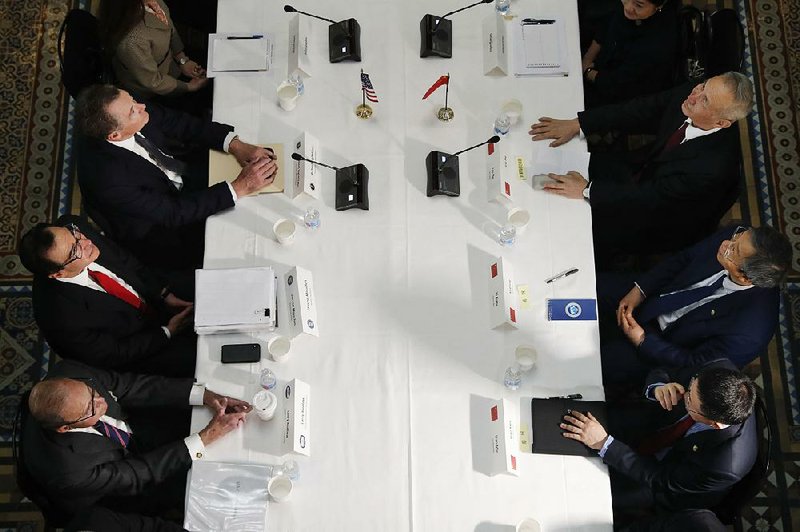A Chinese trade delegation on Friday canceled a planned visit next week to farms in the U.S. heartland, driving down stock indexes as investors turned pessimistic on progress toward resolving the two nations' trade war.
Later Friday, President Donald Trump said China was a "threat to the world" and suggested Beijing was eager to make a trade deal because his tariffs were hurting the Chinese economy. U.S. and Chinese officials resumed negotiations this week and are aiming for a high-level meeting around Oct. 10.
The Trump administration has closely tied economic policy and national security and, in remarks at the White House, Trump said that China was using money pilfered from the United States through unfair trade practices to build up its military.
"Obviously, China is a threat to the world in a sense, because they're building a military faster than anybody," Trump said. "I view China in many different ways. But right now, I'm thinking about trade. But, you know, trade equals military."
The cancellation of the Chinese delegation's farm trip came only about an hour after Trump said he wasn't interested in "a partial deal" with China based on Beijing increasing its purchases of U.S. agricultural products.
U.S. Secretary of Agriculture Sonny Perdue said Thursday that the Chinese delegation's farm tour represented a "goodwill" gesture by Beijing.
But on Friday, the Montana Farm Bureau Federation said it was told by the Chinese embassy that the delegation "had an adjustment of their agenda" and would return to China earlier than planned. The Nebraska Department of Agriculture, which also had planned to host the delegation, confirmed their visit was canceled, too.
The S&P 500 index, which had been up for the day, turned down after news of the canceled trip -- closing down 0.5%. The Nasdaq composite slumped as much as 1.2% before closing down 0.8%.
The decline marks the latest whipsaw for markets that have been roiled repeatedly by the conflict between the world's two largest economies. Hope for a deal, which all but evaporated when talks broke down in May, was rekindled over the summer as both sides pledged to reopen talks. But in August, Trump said he would ratchet up tariffs on Chinese imports; then last week he delayed an increase scheduled for Oct. 1.
U.S. farming has become a main target for Beijing, where leaders are cognizant of the political importance of rural American to Trump's re-election. China's retaliatory tariffs on everything from American soybeans to apricots crimped demand at a time when producers have also suffered from extreme weather.
But Trump told reporters in a meeting with Australian Prime Minister Scott Morrison on Friday that the dispute won't damage his 2020 bid for re-election. He said he wouldn't relent without reaching a "complete deal" with China.
Trump said that while he has an "amazing" relationship with Chinese President Xi Jinping, right now they're having "a little spat."
"I think the voters understand that," the president added. "I don't think it has any impact on the election."
Nevertheless, Trump said it would probably be "positive" for his re-election prospects if the two countries can reach a deal.
Top White House economic adviser Larry Kudlow said recent developments have created a "positive atmosphere" surrounding the standoff, which has been fueled by accusations of bad faith from both sides.
But Trump's remarks Friday tempered any optimism that a partial deal may break the impasse. Administration officials previously have discussed offering an interim trade agreement to China that would delay and even roll back some U.S. tariffs in exchange for Chinese commitments on intellectual property and agricultural purchases.
A limited deal would likely jolt markets and ease the economic burden caused by the conflict as Trump ramps up his 2020 re-election campaign. The president has repeatedly denied that the tariffs have hurt the U.S. economy, saying China is bearing the burden.
Trump has imposed tariffs on $360 billion of Chinese goods and plans to tax nearly all imports from China by the end of the year. The president said that the tariffs have not had an impact on the U.S. economy, despite complaints from American businesses, which say that their costs are going up and their supply chains are being disrupted.
Many of those businesses have applied to the U.S. trade representative for relief from the tariffs and, on Friday, the administration excluded hundreds of products from being taxed.
Those products include imported dog leashes, plastic straws and Christmas tree lighting sets.
Despite Trump's renewed criticism of China, the two countries have been taking steps to ease tension in recent weeks as they try to resolve a dispute that has cast a cloud over the global economy. China has recently allowed its companies to resume purchases of some American farm products after Trump agreed to delay increasing tariffs on another batch of Chinese imports by two weeks, to Oct. 15.
As part of a deal, China wants the United States to roll back the tariffs that it imposed and lift restrictions on American companies doing business with Huawei, the Chinese telecommunications giant. In addition to buying more American agricultural products, the United States wants China to make sweeping changes to its industrial policy, protect American intellectual property and open its market to American businesses.
Information for this article was contributed by Mike Dorning, Jordan Fabian and Mario Parker of Bloomberg News; and by Alan Rappeport of The New York Times.
Business on 09/21/2019
